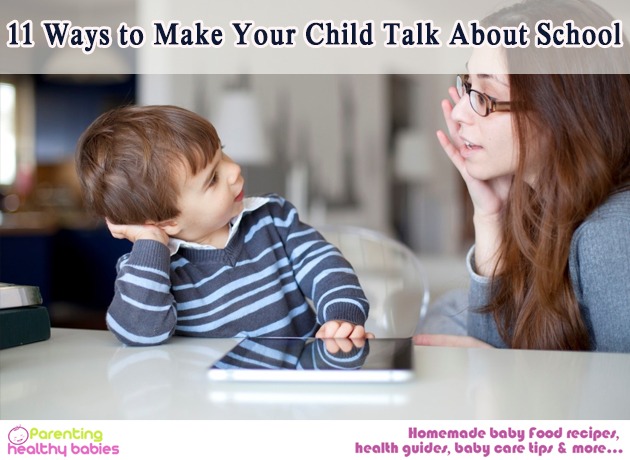Children are the best communicators, because they talk with their whole body, not just their voices. They smile, giggle, fold their arms or make faces as they speak, letting you into a whole dimension of their thought process. However, an area which children do not want to talk about is – school. Ask your child a simple question such as – “How was school today?” and your child will instantly clam up, as tight lipped as a security guard. Every parent wonders why this happens.
So, as a parent you have to think of ingenious ways to make your child speak up about his/her school life. School is a huge area of social interaction and education. A child develops valuable life skills as he/she goes to school and it is important for parents to know how his/her child is performing at school, both educationally as well as socially. Read on for interesting ways to talk about school with your child.
11 Ways to Make Your Child Talk About School
1. Give warm up time
A common mistake made by parents is to immediately pounce on a child after he/she returns from school and start asking questions about school. A child is usually tired and mentally exhausted after school. So when a child returns from school, just give him/her some warm up time. Just greet your child and do not start off with school related questions.
2.You share information first, let your child share later
As a parent, you are eager to know about your child’s school life. However, if you are over eager and forceful with your talking strategies, it will backfire. A child will not share if he/she is forced to do so when not ready to talk as yet. So an easy way to talk is to start a discussion about your day first. And then wait for your child to join the conversation at his/her own time.
3. Ask specific questions
If a parent asks ‘How was school today?’, he or she is likely to get a dull, single worded response such as ‘Fine’ or just an ‘Okay’. And then the conversation is over. So it is more helpful to ask specific questions such as – ‘Whom did you sit with in school today?’, ‘What food did you eat for lunch today? Did you share with your friends?’ or maybe ‘Was swimming class fun today? What games did you play in the water?’. A more specific, open ended question will make your child more interested in speaking up and sharing information with you.
4. Patient listening is the key
When your child talks, listen patiently. Try not to hurry your child if he/she is slow in getting to answer your questions. Generally, children start long winded stories and eventually speak up about what is on their mind – a new school friend or a something a teacher said. So patiently nod and show that you are giving him/her your undivided attention. This will help him/her to understand that he/she has your interest in little things as well as big things in his/her life, encouraging him/her to share with you.
5. Soften your facial and verbal response
Sometimes, as a parent you might react immediately to what your child is saying. For example, you asked your child to go to the library but he/she chose to go for games class option instead. So the moment your child says “I did not go to the library…’, your immediate frown or disapproving look will make your child scared and unwilling to reveal more about his/her school activities. This is because your child does not want to be scolded or meet your disapproval. So do not react too soon, keep a neutral expression, even if you disagree with your child’s opinions or actions. Let him/her share information first, and then convey your opinion in a gentle way.
6. Know your child’s time table
Keep updated with your child’s day to day time table. This way, if you know a specific art project or activity was planned that day, you can ask specifically about it. Children get confused with vague questions so a specific question related to a school activity will bring better communication from your child.
7. Use conversation starters
Find and use the things you see around your child to start a conversation. For example, look into your child’s school bag and see if you can find a note from the teacher or a drawing that can help you initiate a conversation with your child.
8. Use humor
Try telling your child a joke or remind him/her of a funny incident. Humor and laughter relieves stress and makes your child more comfortable and relaxed. In a calm and happy environment, a child is encouraged to share and talk about his/her school day.
9. Let your child solve problems – don’t do it for them!
Often, children are faced with problems at school, such as a fight with a best friend or an unfair scolding by a school teacher. If you, as a parent, jump in to solve his/her problem with a whole lot of suggestions, you may think you are helping your child. But the truth is, you’re not! Dealing with daily life problems makes your child develop valuable life skills of problem solving and conflict resolution. So your job is to start a conversation and provide patient listening and maybe add an occasional word to encourage your child to deal with the problem by thinking of solution him/herself.
10. Have dedicated family time
Sharing at least one meal together as a family is a good way to provide a safe environment for your child. As every family member shares and discusses their day, a child too is encouraged to join the conversation and talk about his/her school day.
11. L.C. – Tender, loving care
Non verbal gestures show your child that you care for him/her. So if your child is not talking or is quiet, give him/her an affectionate pat or hug. Show your child that you love and care for him/her and wait for your child to feel secure in your unconditional love. A child will open up to you if he/she feels love and acceptance through your gestures and behavior.
A child has a whole universe of thoughts in his/her mind. The key to unlocking this universe is to give your child your time and attention, coupled with patience and space for your child to come out of his/her shell.
As a parent, listening is more important than talking!
References
http://www.apa.org/helpcenter/communication-parents.aspx













